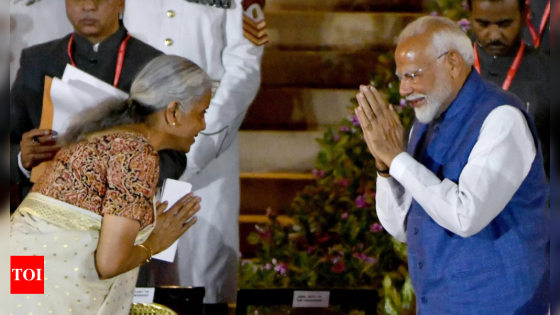Desai, who was the country’s Finance Minister from 1959 to 1964, presented a record six budgets, of which five were full budgets and one was an interim budget.
A day before the budget presentation, Prime Minister Narendra Modi said: “This budget is an important budget of the Amrit Kaal. The five years that we have, this budget will decide the direction of that journey as well as lay the foundation for fulfilling the dream of Viksit Bharat in 2047.”
Key challenges for Sitharaman
The finance minister faces a challenging task in her seventh budget as she attempts to address various competing demands while maintaining fiscal discipline. The need to allocate more funds to social sector schemes and provide additional assistance to states, as requested by allies, must be balanced against the pressure to reduce personal income tax.
Despite the higher dividend from the RBI, which has already been utilised for the solar rooftop scheme, the government requires additional resources to implement Prime Minister Narendra Modi’s pre-poll announcements, such as a new housing subsidy scheme for the poor and expanding the coverage of Aayushman Bharat to include senior citizens.
The budget arithmetic will rely on higher revenue, tax revenue, and capital receipts collections compared to the interim budget estimates.
However, since the interim budget, the political landscape has shifted, with the BJP now relying on allies to govern at the Centre, although it still holds 240 seats in the Lok Sabha. The growing concerns over lack of jobs, persistent weakness in private investment, income disparity, and regional imbalance have heightened expectations for the budget to address these issues, with a focus on youth, women, and farmers.
20 hours earmarked for budget discussion in Lok Sabha
The Lok Sabha’s business advisory committee on Monday decided to discuss issues related to the ministries of railways, education, health, MSME, and food processing besides the Union budget. A total of 20 hours has been allocated for the debate on the budget.
Sources of news agency said the BAC, which includes representatives from different parties, took the decision on the session’s agenda, with some opposition members seeking a discussion on a host of different issues.
They, though, added that the discussion on demands for grants to the five ministries will allow members to speak on a host of matters related to them.
6.5-7% growth in FY25: Economic survey
Finance Minister Nirmala Sitharaman also presented the Economic Survey for 2023-24 in Parliament, stating that the Indian economy is on a “strong wicket” and is well-positioned to weather global challenges.
According to the economic survey, India’s GDP is expected to grow by 6.5-7 per cent in the fiscal year 2023-24, making it one of the fastest-growing major economies in the world. The survey attributes this growth to the government’s proactive measures, including supply-side reforms, infrastructure investment, and targeted support to vulnerable sections of society.
The survey also highlighted the resilience of the Indian economy in the face of global headwinds, such as the ongoing Russia-Ukraine conflict and the slowdown in major economies. “India’s growth is expected to remain robust in the coming year,” the survey states, adding that “the country’s strong fundamentals and structural reforms will continue to support growth.”
The survey also emphasised the importance of continued investment in infrastructure, human capital, and technology to sustain long-term growth. It calls for further reforms in areas such as labor laws, land acquisition, and ease of doing business to attract foreign investment and boost domestic manufacturing.
Source Agencies



